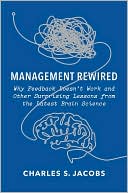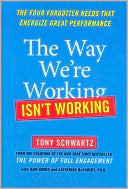Management Rewired: Why Feedback Doesn't Work and Other Surprising Lessons from the Latest Brain Science
Search in google:
How brain science can help us make smarter management decisions Businesspeople are taught to make decisions with facts and logic and to avoid emotional bias. But according to the latest research, we almost never decide rationally, despite thinking that we do. Our experiences carry an emotional charge, encoded in the synapses of our neurons. And when we try to deny what our emotions tell us, we lose what we've learned from the past. That's just one of many recent discoveries that help explain why management is so challenging. As Charles Jacobs explains, much of the conventional wisdom taught to managers is not only inadequate, it produces the opposite of what is intended. The better path is frequently counterintuitive. For example, it turns out that pay doesn't really drive performance. When we do work that's inherently engaging, the neurotransmitter dopamine is released, creating feelings of pleasure not unlike a cocaine high. But when we work primarily for money, the dopamine isn't triggered and it's harder to stay motivated. Once we understand the lessons of neuroscience, we can create more effective strategies, inspire people to maximize their potential, and overcome the biggest hurdle to improving business performance-making change stick. Publishers Weekly Jacobs, founder of the Amherst Consulting Group and managing partner of One Eighty Partners, debunks management myths in this provocative, counterintuitive volume, demonstrating how relying on emotions-rather than logic-leads to better business decisions. Jacobs draws on the latest research showing that positive and negative reinforcement don't improve performance, quantifiable objectives cause workers to fixate on the short term and sacrifice long-term focus and certain common management practices produce the opposite of the intended effect. He examines the limitations of current organizational strategy in light of brain science, using layman's language to map out how the brain interprets experience and responds to feedback, reward and punishment. He asserts that organizations that are able to apply brain science to their businesses will have a decided advantage over the competition, and he shows how his findings can enhance performance at every level of a company. Well argued and substantiated, this book turns prevalent management theory on its head and will have lasting impact on how it is taught in business schools and implemented in organizations. (May)Copyright © Reed Business Information, a division of Reed Elsevier Inc. All rights reserved.
Introduction 11 Brain Science 72 From Brain to Mind 253 Working Relationships 454 Managing Upside Down 675 Organizing Leverage 916 Thinking Strategically 1137 Changing Minds 1398 Leading Ideas 1639 All Things Are Ready 187Notes 203Acknowledgments 209Index 211








